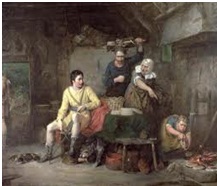|
 |
|
 |
Alfred the Great Leadership
Alfred the Great (849-899) The only English king ever to be called ‘Great’, famous for the legend (almost certainly false) of his burning of the cakes. Alfred (pictured right) saved his Kingdom of Wessex, covering the south of England, from the invading Danish Vikings. The Vikings settled in England’s other major kingdoms: Mercia, York, Northumbria and East Anglia .
Why was he a great leader?
1. Vision He had a far-sighted ideal for Wessex based on
This vision was remarkable for a country more used to war than civilized society.
2. Love of books, learning and knowledge He:
His main aim was to teach people to read, so he re-stocked the libraries and made education a top priority. This was an astonishing plan, bearing in mind that the Bible was only translated into English by John
Wycliffe (pictured right below) 500 years later! Alfred was worried, because many of the monasteries (then centres of education) were destroyed by the Vikings.
3. Communication He wanted his written policies and orders clearly communicated and understood, which is why education and literacy were so important to him (see point 2).
4. Servant and fighter Despite his epilepsy, he served his people wholeheartedly and gave them a more active role in government but without democracy. He was particularly concerned with their spiritual welfare. But by 878 he had neglected them, because of constantly fighting the Vikings. After the Vikings captured Chippenham in Wiltshire, he fled to the Somerset marshes, where (legend says) his neglect led to the burning of a peasant’s cakes (right in Harry Payne's painting). This prompted him to rally his troops, learning from the Viking tactics of guerrilla warfare and defeating them at the crucial Battle of Edington (878).
5. Ruthless but kind and persuasive He was a kind and forgiving man, but the events of 878 (see point 4), showed that he had to be ruthless with the Vikings. But he made lasting peace with them and their leader, Guthrum. So he persuaded him to become a Christian and swear allegiance to him in God’s name. Alfred also made him one of his princes to keep him on his side. The Vikings settled permanently in Yorkshire, Lincolnshire, Leicestershire and East Anglia (the names of Viking towns often end in ‘by’ and ‘thorpe’). Alfred guaranteed Mercia’s loyalty by giving it control of London after he captured it in 886.
6. Control by the law The crisis of 878 convinced Alfred of the importance of a legal system based upon a system of courts and loyal allegiance to the king. If anyone broke their oath of allegiance, they would be guilty of treason and die. The most important court was the king himself, and Alfred was extremely fair to everyone in his judgments, earning the title of “protector of the poor”. His Law Code (based upon the Ten Commandments and Christian teaching) became a vital part of English law.
7. Military strength He greatly improved the army and navy and is regarded as the founder of the British navy. He also built well defended boroughs (or burghs) throughout the country to protect people from outside attack.
8. Religion He was very religious, and obeying God’s will was extremely important to him.
9. Reflection He discovered that difficulties, not successes, forced him to reflect and improve himself and his leadership. “In prosperity a man often destroys the good he has done; amidst difficulties he often repairs what he long since did in the way of wickedness”, he said.
Key quotes on ethics My will was to live worthily as long as I lived. If he seeks to judge another, he should wish upon no man that which he would not want to wish upon himself
Key quote on learning He seems to me a very foolish man and very wretched, who will not increase his understanding while he is in the world. |
|
|
||
|
|
|
||
|
||
| Copyright © wisdomtowin.com All Rights Reserved | ||
|





